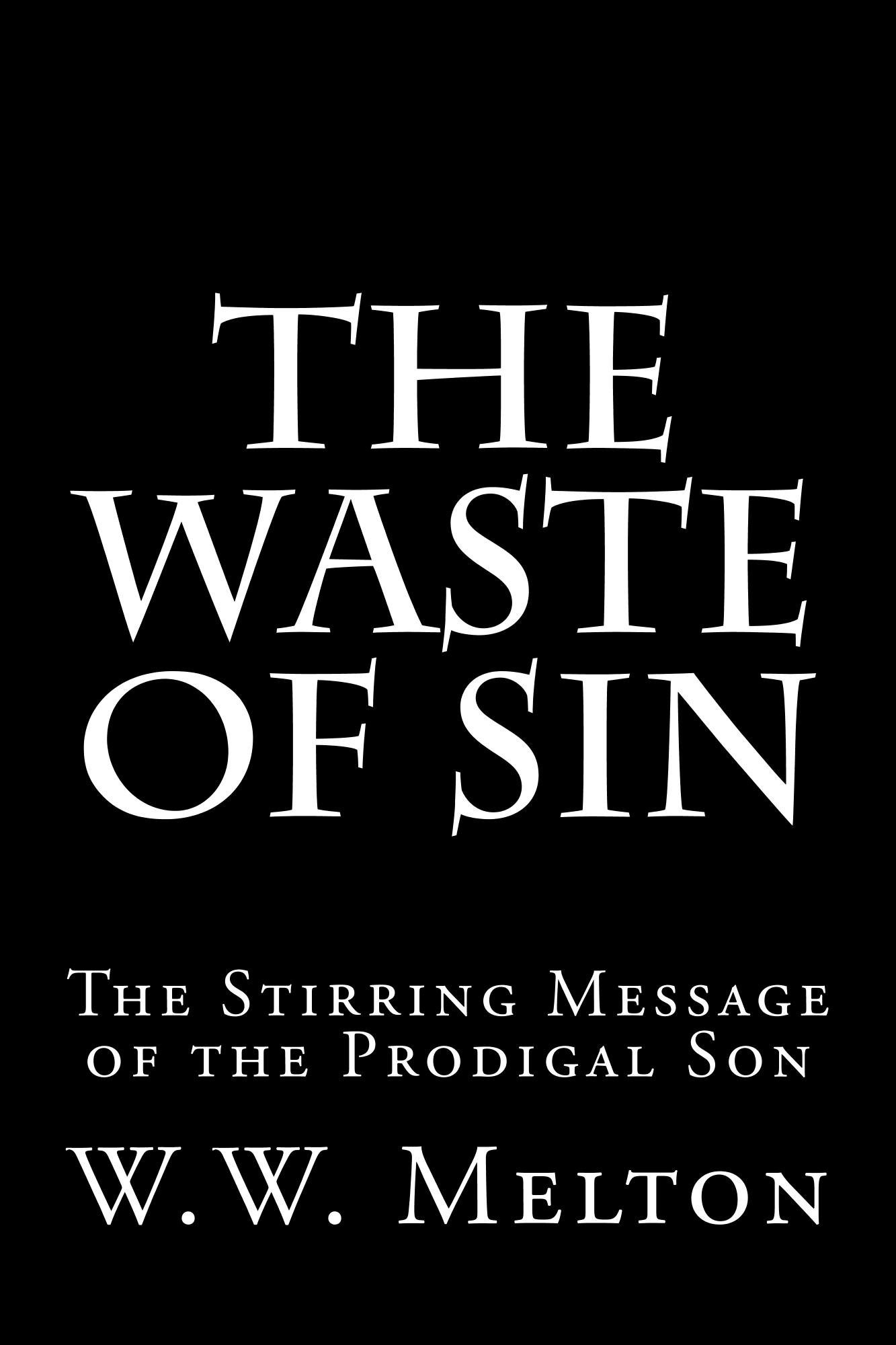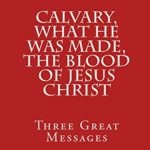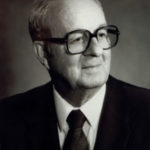Description
The Waste of Sin
(some of the best messages on the prodigal son you will ever read)
The Stirring Message of the Prodigal Son
by
W.W. Melton
2015
PREFACE
I. THE BEGINNING OF SIN
II. THE WASTE OF SIN
III. THE TRAPS OF SIN
IV. THE WRECK OF SIN
V. THE SLAVERY OF SIN
VI. THE DESTITUTION OF SIN
VII. THE REALIZATION OF SIN
VIII. THE CONFESSION OF SIN
IX. THE TURNING FROM SIN
X. THE FORGIVENESS OF SIN
XI. THE COVERING OF SIN
XII. THE UNCONFESSED SIN
XIII. THE SOLUTION OF SIN
PREFACE
The parable of the Prodigal Son is made the basis of the discussion found in this little book. It is no attempt to spiritualize every word and line of the parable, but because the author seemed to see in it the clear outline of a dozen cardinal principles of Christian theology, it seemed good to him to set them forth in the relation they bear to each other in the parable. Neither is it a series of sermons. While such a series was preached from the pulpit of the Seventh and James Street Baptist Church, there is no attempt here to reproduce them.
Neither do we claim to set forth a compendium of theology, for there are some vital matters not hinted at in the little passage; but it is a brief discussion of the fundamentals found in this, the most natural of all stories. And as such doctrines as are found here play such a large part in the average life, and as they sweep the field from the highest note to the lowest dirge, and lead the reader along the trail which many a soul has passed to his ruin, it is the plan to point them out in their relation to the parable, then to enlarge upon them in a way that will meet the danger, or the need of some wanderer along life’s path.
There is no special merit claimed for the little volume, but it is sent forth with a prayer that it shall bless some life: that a danger signal shall be swung across the path of a reckless or careless one: that a light of hope shall be held high for some honest enquirer feeling his way back to God and peace: that a call shall be sent out that shall pierce the almost impenetrable chasm of despair and find some soul ready to die, and shall plant hope and courage in the heart, and turn his eyes back to a God of compassion and mercy.
W.W.M.
Waco, Texas.
I. THE BEGINNING OF SIN
“And the younger of them said to his father, Father, give me the portion of goods that falleth to me.”—Luke 15:12.
The story herein analysed, has been too narrowly interpreted by some and too liberally expounded by others. To some, there is but an allusion to the relation of Jew and Gentile; while to others, the story of the backslider is easily found; and to still others, the unsaved have a preachment on how to be saved. There might be a message to each and all of the classes mentioned, but all such readers have been limited in their interpretation. While on the other hand, it is easy to overspiritualize the parable, and make it say too much. And we do not profess to be entirely free from either extreme, but it shall be our honest endeavour to give a careful study of the many doctrines hinted at, without unduly magnifying them.
THE STORY BEGINS WITH THE FIRST VERSE. Why should we overlook everything until the wanderer turns his face back home before we see beauty and meaning in it? A very important, and a most vital lesson, is set out in the very first words. The beginning and the responsibility of sin is most clearly defined. The seed is here planted from which the great harvest of sorrow and shame comes. The full grown sin of the later life eclipses the infancy of sin; yet, the immature sin, the thing in its swaddling clothes, is just as important, and just as serious, as older and more developed evil. The floodtide of wrongs and shame and heartaches, which gushed like a torrent down the path of his life, was let loose here. This is the fountain from which sprang that putrid stream of miasma and death found in the after years. All the succeeding tragedies were invited, challenged, welcomed when he demanded his goods and walked away with a high head and stubborn will. There would have been no wasting of all if there had been no demanding at all. There would have been, no sorrow in the end if there had been no folly in the beginning. The wasting, the squandering, the wanting, the hungering, the longing, the repenting, the returning,—all, had their origin in the beginning.
And WHAT IS TRUE IN THIS PARABLE IS TRUE IN LIFE. The bold and vicious sins of life are but the little ones fully developed. When I was a boy in the adolescence period, I developed a fondness for killing rattlesnakes. One day I heard one rattle in the high grass, and I was at once trying to find him. I knew from his rattle he was small, and without a great deal of care.
I was parting the tall grass to find him, when a man with me cautioned me of the danger. I replied that he was a little one, and that I was not afraid. But the friend said: “It is a rattlesnake, and that is enough.” All of the poison and death of the full-grown ones is in the nature of the little ones; and in like manner, the little sins contain the poison of hell just as the larger ones do. Just as one drop of rain may be the forerunner of a great deluge, or the first gust of wind may be the announcement of a coming storm, or the first crackle of a flame may be the beginning of a disastrous conflagration; even so the first sin may prove the bursting forth of a pent up spirit that leads to utter ruin. During a season of much rain, when the Brazos River threated to overflow its banks and flood the eastern section of the city of Waco, guards were stationed along the levee to watch the low places, and give the alarm should a little stream trickle over the embankment. All through the dark and rainy night men stood in careful vigils protecting the property and lives of the people against that first little harmless stream that might venture to break over the danger line. It was not the little stream they were afraid of, but the great flood of which the little stream was the forerunner. The sins to be most carefully guarded are the little ones; with these controlled, there is little fear concerning the greater and more shameful ones.
ANOTHER FACT IN THIS VERSE DESERVES SPECIAL MENTION: THE POSSIBILITIES AND POTENTIALITIES OF LIFE. Both good and bad lie dormant in every heart, waiting to be called out. It would be purely speculative to tell what the prodigal might have been, and what he might have done, instead of wandering and squandering. Yet, it is a speculation that has a note of certainty in it. His life was what it was because he chose it to be so. It could have been otherwise, and would have been otherwise had he so decided. He stood at the parting of life’s roads. To the right ran the path that led upward and onward to development, prosperity, happiness, usefulness and kindred blessings. To the left there ran the road to ruin. This first choice is life’s most pivotal hour. Let not the beginning of anything to be despised. The end is inherent in the beginning. Just as the oak is in the acorn, and the fire is in the match, and the sin is in the thought; even so is the harvest in the seed, whether it be in grain or in deeds. The coming harvest depends on whether thistles or good grain be sown. The same heart can love or hate; the same tongue may speak words of honour or of shame; the same life may be a blessing or a curse. The prodigal might have remained at home in peaceable relations; and the elder brother might have been the one to go astray. Your life holds the possibilities of the highest heaven and the lowest hell. You alone can determine the course, the harvest, the end.
WHAT WAS THE SIN UNDERLYING THIS FIRST STEP? He was doubtless of mature age. His will must be recognized, as well as that of his brother and father. There was no sin in asking and receiving that which was his by the authority of the law. The sin was rather in his giving way to his baser passions, in yielding to the call of the wild life in the far country, in magnifying his legal rights to the exclusion of his moral obligations. It was a sin against reason and love, against conscience and light. He may have had a legal right to go away and to spend as he pleased; but men do not have to exercise all the legal rights they have. He also had a right to remain at home, to be obedient to high authority, to continue in relations of love and fellowship with all at home. Why were these rights ignored and the right to squander and waste so cherished? What hobbies men do make of their rights. With the cloak of legal rights and personal liberties and free-moral-agency, many cover themselves while they carry out wicked and hurtful designs. I have a right to lie in the filth of the gutter if I want to, but I have another right, not to do it if I do not want to. Which shall I exercise? I have a legal right to squander all I earn, to go half clad, and poorly fed if I want to, but it does not suit me to exercise this right. I have a legal right to be a worthless ignoramus if I so choose, but such a right is not good to be followed; it would prove a curse to myself and to all who touch my life.
YOUNG MEN IN PARTICULAR LOOK UPON LAW AND AUTHORITY AS INTERFERING WITH AND LIMITING THEIR PERSONAL LIBERTIES. They often regard them as enemies to be evaded, as taskmasters to be outwitted. They count themselves clever if they can violate their demands and escape without punishment. Obedience to constituted authority is a yoke that galls the neck of some. But law and authority are synonyms for protection and strength and safety. It is not the distaste for the work to be done, but the rebellion against authority that makes life unhappy for them. Here is the danger zone for the young and surging life. The majesty and authority of law, whether it lie in the home, in the schoolroom, or in the state, is the thing that deserves the recognition and respect of every citizen, from the helpless babe in its mother’s arms to the white-haired man bent under the burdens of a long life. The weakness at this point is responsible for the crime wave that sweeps the whole nation, for the bold robberies, the daring crimes, the bloody murders, the heartless and ruthless mobs that rise up to take law in their own hands without the voice of authority behind them. Here is a call to parents as well as to children; a challenge to the very best wisdom and skill, for the steadiest hand and the keenest wit to guide through these years when life is unsettled, and can be turned as on a pivot.
THE RECKLESS LIFE OF THE PRODIGAL MIGHT BE EXCUSED ON THE GROUND THAT HE WAS JUST A BOY, and boys are expected to sow wild oats. We do not know where this sentiment originated, but it has been greatly overworked by the evil one. Boys, do not have to sow wild oats. When did a boy ever sow wild oats that did not reap wild oats? Why wild oats? I have never liked that word wild. It is the main difference between the kind shepherd’s dog and the sneaking coyote of the hills; one is wild and the Other is tame. It is the difference between the gentle horse, the pet of the family, and the wild mustang, with shaggy mane and tail, untamed and untamable. It puts the sour in the luscious grapes, and makes the apples little and ugly. It turns the purring kitten into a vicious catamount, robs the flowers of their glory, and puts thorns on the roses. While in man it snatches from him his refinement, culture, skill, and attractiveness. It puts a keen edge on his tongue until it cuts like a whip. When ambition is wild it is dangerous, it is worse than a runaway locomotive; nothing is safe in its path, and there is certain disaster just around the curve.
THE FATHER YIELDED TO THE SON’S DEMAND. Yes, yielded knowing it was not the best; but because there was no recourse. Yielded after love and reason had failed; when warning and supplications had been disdained and made a joke of. This was his choice, and the father could only wait in silence to see the sad but inevitable end. How sad is the picture! And sad because it is so true to life. Every city and town and village has its streets lined with homes in deepest mourning. No, not for their dead, but worse, for their prodigals. Sons and daughters who have thrown off restraint, and will not be counseled; who with strong wills and stubborn hearts go out to be wanderers in the earth. And parents must sit in silence hoping and waiting and praying until some strange providence halts them and sends them back, sadder but Wiser.
BUT SOME ONE WILL INSIST IT IS NOT SO BAD AFTER ALL; he will return. He may return, but he will come back worse than when he went away. He may return, but he will come covered with the scars and shame of sin. He may repent, but he can not undo the past. He may come with bitter tears, but the guilt clings to him wherever he goes. He may be forgiven and restored to a son’s place; but he can never be as if he had never gone out. It is not enough to excuse one’s prodigality on the ground that he will give it up some day. Let it be remembered that forgiveness does not take away the scars sin has made.
BUT WHO KNOWS THAT HE WILL RETURN? Thousands never return. It is dangerous presumption to play with sin and destiny on such a flimsy pretext. Multitudes have thus foolishly endangered their lives, their destinies, and their souls. It is like setting fire to a beautiful building, saying: “It can be put out”; or like permitting a vicious dog to tear a child’s flesh, saying: “It will heal again.” These hoped-for ends may come, but the risk is too great. And if there is no risk at all, the incident loss and suffering in the process is useless and senseless. Recklessness and wickedness are not to be excused and apologized for; but are to be corrected as early as possible, that the inevitable wasteland hurt, and loss which are certain to follow may be avoided.
THE FIRST STEP IN THIS TRAGIC STORY IS A SIGNIFICANT ONE, because on it hang all the succeeding steps. It also shows uncontrolled ambition will bring; and what life will come to when given free rein. It is the first outburst of an unprincipled life. It is the first defeat in life’s great warfare. Let the beginning be guarded, and the end will have no dread. Let the first overdraft be avoided and there will be no bankruptcy; let the first drink be shunned and there will be no drunkard; deny Satan his first victory and hell shall have no fears in the future.
A Prodigal Friend
In my early life I knew a man who was the joke and byword of the town. Soon after I entered the ministry, I became so interested in him I cultivated his friendship that I might know how to help him. One day I asked him for the story of his life. It was very similar to the story of the prodigal son, save he never returned. Twenty years had passed since he had heard a word from his old home and loved ones. I could not prevail on his writing them, for he hoped to die without their ever knowing how he had lived. He soon passed away, and was buried in an unmarked grave, with no mourner and no flower. His failure hung like a danger signal in the path of every boy who knew him.
THIS WASTER WHO WENT OUT FULL-HANDED CAME FINALLY TO FEEL THE PINCH OF HUNGER AND POVERTY. He suffered for his wrong. But herein lies another lesson; of much importance. He was not the only one who suffered. If sin would stop with the one sinning, life would be different. If none suffered but the evil-doer, how different the tale. But the father suffered more than the boy. I never realized how true is this principle until I was in a home from which a son had gone. He was a wanderer somewhere in the earth. They mourned for him as for one dead; they pitied him in a most pathetic way. An indescribable sorrow filled the home. They gazed on his photograph and wept as they looked. Then I, came to know in a new way that the wrong-doer does not suffer alone. I have no doubt that if that son had known how his sins hurt the ones at home he would have returned with shamed face, and the wrong would have been quickly atoned for. Oh, the multitudes who suffer for sins that others have done! Mothers for their children; wives for wicked husbands; fathers for wayward boys; whole communities in sackcloth over the deed of one man. Even a world may be torn to bits over the crimes of a single man. Yes, the innocent suffer for the guilty.
So without seeking in the least to make this first verse the central lesson of the parable, it must be admitted that THE ORIGIN, THE BEGINNING, THE GUILT, AND RESPONSIBILITY, ARE EASILY FOUND in bold outline. That he only was responsible for his wrong is a fact not to be denied. That he could have chosen a different course, and come to a different end, is also a conclusion of all who think. With these facts before us, with what force does that Scripture hammer our conscience which Hosea gives us, “Thou hast destroyed thyself.” The responsibility can not be shifted to others. Others may influence, environment may make it easy or hard to do right or wrong, but we sit in judgment on our own characters and lives; and ours is the deciding voice as to what shall be done or not done. Therefore, let every tempted soul stop before he yields, and remind himself that his decision is final, and there is no undoing the deed; and for it he shall suffer, and be judged and condemned.
A LAST WORD: LIFE IS TO BE CONTROLLED, HELD IN CHECK, DISCIPLINED, GUIDED. Every heart is filled with enough wild passions to wreck it if let alone, or misguided. Not every wish is to be satisfied, and not every passion yielded to; but desires, ambition, passions, and longings of the heart are to be guided with a steady hand. Such are to be made servants and not masters. Herein is the secret of success and failure; of happiness and unhappiness. Steam is good, but it must be controlled or it becomes dangerous. Fire and electricity are powers for good or bad, but they must be controlled; they may be destructive or constructive; they may preserve life or take life, the use is determined by the user. Even so life is plastic, full of potentialities for good or bad, give it your best thought and sanest counsel, and firmest grip, and it will honour you, and bless the world and glorify God.





Reviews
There are no reviews yet.